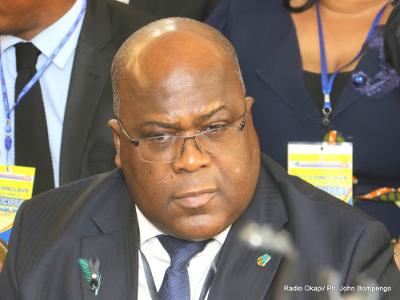The Constitutional Court had analyzed two appeals introduced by Martin Fayulu and Theodore Ngoyi challenging the provisional results published last week by the INEC.
In his petition, Mr. Fayulu had asked for the annulment of the provisional results, a manual recount of the votes, and the review of the data collected by the electoral observers from the National Episcopal Conference of Congo (CENCO) and others, who said that Martin Fayulu was the actual winner of the presidential election.
Mr. Fayulu had also said that the INEC had violated the constitution by excluding four constituencies from the provinces of North Kivu (Beni and Butembo) and Maï-Ndombe (Yumbi) representing 1,359,000 voters.
He requested that the INEC be ordered to organize the elections in those areas within two weeks, and postpone the publication of the results pending the results from the excluded constituencies.
The Constitutional Court rejected Mr. Fayulu’s demands, saying that he had either not provided evidence for the allegations of fraud he had raised, or that the INEC was in its right to cancel the elections in Beni, Butembo and Yumbi. The Constitutional Court rejected a recount of the votes, and also rejected the annulment of the elections, saying that the elections were done in a regular manner.
With the proclamation of the final results of the presidential election by the Constitutional Court, Felix Tshisekedi is thus elected president of the Democratif Republic of Congo by a simple majority for a 5-year term. He will become the fifth president of the DRC. He will succeed Joseph Kabila, who has been in power since January 26, 2001.
The next step on the updated INEC’s electoral calendar is for the new president to take the oath of office on January 22. This will be the first peaceful transfer of power in DR Congo.
Related articles
- • Canada and Germany Impose Sanctions on Rwanda for Supporting M23 Rebels (March 4, 2025)
- • Tshisekedi Announces Government of National Unity and Calls for Unity Against M23 Rebels (February 23, 2025)
- • US Sanctions Rwanda's Minister James Kabarebe for Central Role in DR Congo Conflict (February 20, 2025)
- • Rwanda-Backed M23 Rebels Summarily Executed Children in Bukavu, UN Reports (February 19, 2025)
- • DR Congo Citizens Head to Polls to Elect President, Members of Parliament (December 20, 2023)
- • 'Deadly environment' plus 'political and social' obstacles hinder Ebola fight, Security Council hears (July 24, 2019)
- • Ebola outbreak declared an international Public Health Emergency (July 17, 2019)
- • Felix Tshisekedi Sworn In as DR Congo President (January 24, 2019)
- • Martin Fayulu Challenges Presidential Election Results in Court (January 12, 2019)
- • Felix Tshisekedi Vows to Be the President of All Congolese (January 10, 2019)
- • Martin Fayulu Rejects Presidential Election Results (January 10, 2019)
- • Felix Tshisekedi Elected DR Congo President (January 10, 2019)
- • DR Congo Delays Results of December Election (January 6, 2019)
- • Bemba, Katumbi renew their support for joint opposition presidential candidate Fayulu (November 16, 2018)
- • Vital Kamerhe also withdraws support for joint opposition presidential bid (November 12, 2018)
- • Felix Tshisekedi withdraws support for joint opposition presidential bid (November 12, 2018)
- • Oppositioin leaders pick Martin Fayulu as joint presidential candidate (November 11, 2018)
- • Jean-Pierre Bemba banned from running for president (August 25, 2018)
- • Vital Kamerhe named UNC presidential candidate (August 4, 2018)
- • Bemba says Katumbi should be allowed to run for president (August 4, 2018)
- • Moise Katumbi blocked from entering DR Congo (August 3, 2018)
- • Jean-Pierre Bemba Returns to DR Congo (August 1, 2018)
- • Jean-Pierre Bemba named MLC presidential candidate (July 13, 2018)
- • Botswana Urges Joseph Kabila to Step Down (February 26, 2018)
- • No elections in DR Congo in December without electronic voting machines: INEC (February 13, 2018)
- • US Warns DR Congo Against Electronic Voting for Delayed Election (February 12, 2018)
- • Presidential election scheduled for December 23, 2018 (November 5, 2017)
- • Felix Tshisekedi accuses INEC of illegally prolonging Kabila's mandate (October 24, 2017)
- • DRC Seeks Arrest of Presidential Candidate Moise Katumbi (May 19, 2016)
- • Papa Wemba Is Buried in Kinshasa (May 4, 2016)








